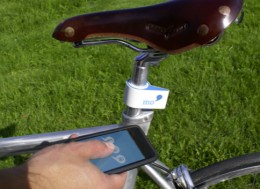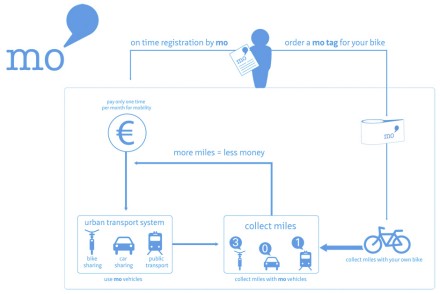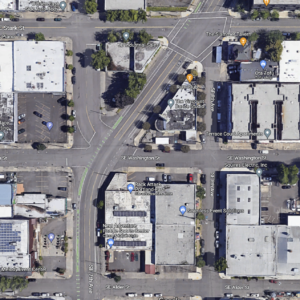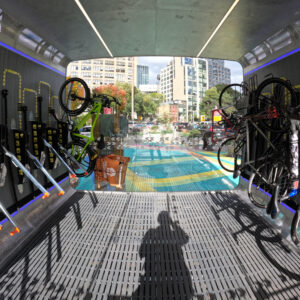
(Photo: Mo)
A reader tipped me off to a new urban mobility concept recently launched in Munich that is really blowing my mind… Or should I say “mo”-ing my mind?
Introducing “mo” (short for mobility); a system that hopes to someday integrate bike-sharing, car-sharing, and transit access into a seamless network that just might be the future of how cities tackle mobility challenges. The video below explains how it works…
mo – mobility for tomorrow from LUNAR Europe on Vimeo.
The system has yet to be fully rolled out and was just launched (as a concept) less than a month ago in Munich. It was created by a collaboration of a design firm, an environmental-minded non-profit, and a university. The appeal of the system seems to be its simplicity. Users sign up for one card which them gives them access to rental bikes (cargo and e-bikes figure prominently), cars, and transit fares/schedules/trip planning services. There’s also a behavior change element in that you earn “mo miles” when you bike which you can then redeem within the system to make vehicle rental fees cheaper.
The designers of the concept have gotten several major things right: electric and cargo bikes play a central role, the system is multi-modal, there are cash rewards for driving less, and it’s all integrated onto smartphones and a slick, unified brand identity.

Here’s more from a company press release:
“It emerged [from surveys and focus groups of Munich residents] that many people would be quite happy to do without a car of their own if more attractive alternatives were available. “mo” provides these alternatives: the appropriate means of transport is available for any occasion and in any situation, even spontaneously. “mo” could be implemented inexpensively and rapidly and would require only a moderate amount of technical infrastructure/outlay. In the form of a smartphone app, “mo” becomes a practical ‘location-based service’ that encourages spontaneous usage of the mobility system even on the go.”
In a low-car leaning, innovative transportation-loving place like Portland (which was just named 2nd best place to live without a car in America) this seems like the type of city were mo could gain momentum.
Learn more at mo-bility.com.







Thanks for reading.
BikePortland has served this community with independent community journalism since 2005. We rely on subscriptions from readers like you to survive. Your financial support is vital in keeping this valuable resource alive and well.
Please subscribe today to strengthen and expand our work.
incredible. And our opinion makers in this state are talking about the CRC!
Awesome story. This connects directly to the article last week about PCC building a parking garage. We have to change the behavior of the MO users and the institutions like PCC that don’t believe students would prefer to leave their car at home.
quote>>>>>”many people would be quite happy to do without a car of their own if more attractive alternatives were available. “<<<<<
We need to define both "attractive" & "available" in the United States. PCC should spend some money doing a well researched survey of students.
PCC Cascade just installed a ton of bike racks over the past year. Looks like they’re trying to improve parking for everyone because the Cascade campus has lousy car parking
(1) http://www.mitfahrgelegenheit.de a nationwide system of prearrangable carpooling with strangers and a distance-based fee structure. Everyone (at least in Germany) uses it. It is cheap, fast, and from what I can tell everyone loves it. It has been around for more than a decade and I think they’ve worked out the kinks
(2) trains: unbelievable. On time, fast, and contrary to our public transit fee schedules, there are about 13 ways to get a reduced fare on German trains. Buy ticket 3 days in advance: half price. Travel alot: buy a Bahncard and get 25 or 50 or 100% discount. I don’t know anyone who buys the 100% version but you could.
http://www.bahn.com/i/view/DEU/en/prices/germany/bahncard.shtml
(3) bicycle infrastructure… well let me count the ways. Actually the biggest difference it seems to me is that in towns the cars are frequently restricted to 30 kmh/19mph so the whole nutcase-driver blowing past you at 3x your travel speed thing doesn’t come about.
Very interesting total package – it wraps up nicely some of the things I have been thinking of. Is it a game changer for bike sharing investment? The video was made 12 months ago…
Write your Congressional rep. to allow FTA projects (like CRC) to count and credit (and build) bike trips into their projects.
[Sadly that has not been the case withe the CRC – that’s why there are honkin large P+R structures planned for Vancouver’s downtown.]
Love it. One missing link: a “mo-foot” pedometer to record all pedestrian travel.
My 10 commutes a week usually break down to 6 runs and 4 bike rides, and I’d want to get full “credit” for reducing strain on our transportation systems.
This is very cool! Would love to see something like it in Portland — it would make Zipcar more affordable for me, since I use it pretty rarely. Counting walking trips would definitely be nice.
So when you say “over there” (something I pointed out in a comment that was censured in reference to a term that gets hurled around on this site), you are actually only talking about 3-5 countries at the most who are highly industrialized and not as large as most US states, and not the other 100 or so countries covered in your blanket statement? Or are you actually talking about Burma? Bangaladesh? Djibouti? They are “over there” too.
Scott,
what is your point? And who are you quoting?
What a nice way to wrap up the various transit options all together! Pretty cool! Maybe we’ll get it in Washington, D.C. someday! Wonder how much a program like this costs to put together?
I have wondered why zip car doesn’t do bike share?
Couldn’t their key cards be used to lock and unlock a bike?
Couldn’t a bike spot for two bikes fit at the front of each car spot?